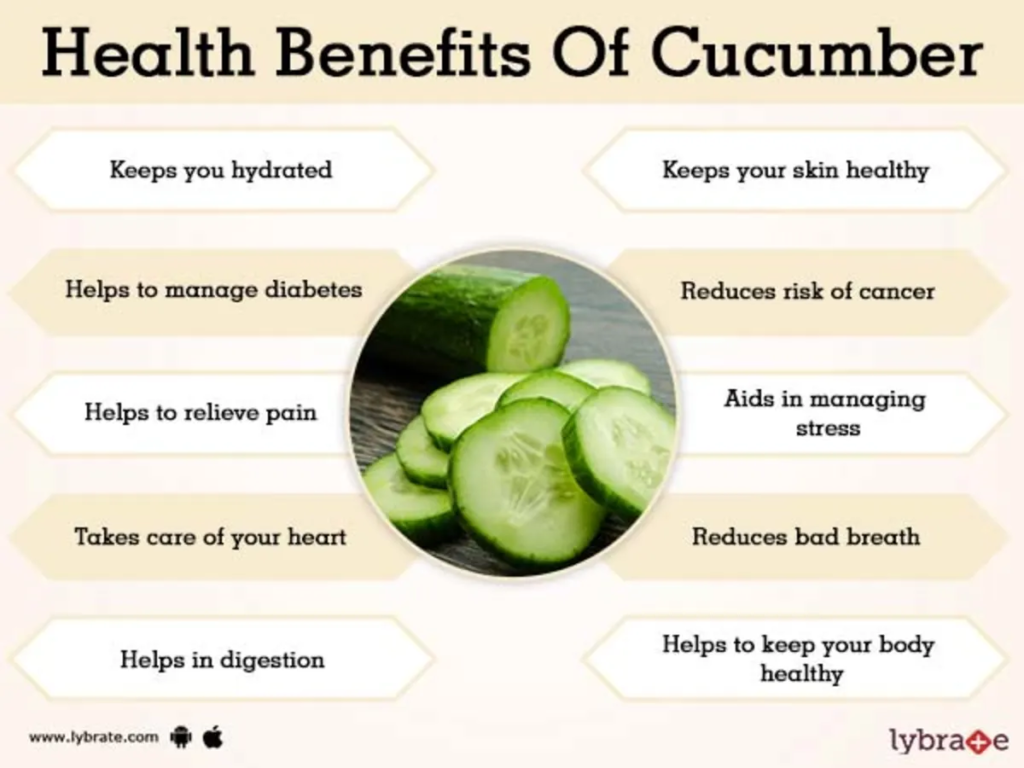Here is a quick overview of the health benefits of eating cucumbers:
- Cucumbers are low in calories and high in water, which can aid weight loss.
- They contain fiber that supports digestion and prevents constipation.
- Cucumbers have vitamin K which promotes bone health.
- Antioxidants in cucumbers benefit heart health.
- Applying cucumber to skin can ease sunburn pain.
Introduction
Cucumbers are a refreshing, hydrating, and nutritious vegetable that offers a variety of health benefits. With their high water content and low calorie count, cucumbers are an ideal food for weight management. Beyond hydration and weight loss, cucumbers contain antioxidants, fiber, and vitamins that make them advantageous for digestion, bone health, heart health, and even skin health. This article will explore the key nutrients in cucumbers and provide a comprehensive overview of their many health benefits. Discover why you should consider adding more cucumbers to your diet.
The first paragraph introduces the topic of cucumbers and their health benefits. The second paragraph clearly states the purpose of the article is to provide a comprehensive overview of the key health benefits of eating cucumbers. The third paragraph emphasizes the depth of information that will be provided. The fourth paragraph summarizes the scope of the article.

Key Nutrients in Cucumbers
Cucumbers are low in calories but high in beneficial nutrients like water, fiber, and antioxidants. Here is a quick look at some of the top nutrients found in cucumbers:
- Water – Cucumbers are 95% water, making them an excellent food for hydration. The high water content is one reason why cucumbers are so low in calories.
- Fiber – A 1 cup serving of sliced cucumbers contains 1.5 grams of fiber. The fiber in cucumbers can aid digestion.
- Vitamin K – Cucumbers contain 21% of the recommended daily intake of vitamin K per cup. Vitamin K supports bone health.
- Antioxidants – Cucumbers contain antioxidants like flavonoids and tannins that have anti-inflammatory effects and may benefit heart health.
- Potassium – Cucumbers provide 8% of the daily value for potassium per cup. Potassium helps control blood pressure.
This section outlines key nutrients and reinforces why cucumbers are a healthy addition to your diet.
Do Cucumbers Help With Weight Loss?
With their high water content and low calorie count, eating cucumbers can support weight loss efforts. But how exactly do cucumbers promote weight management?
- Low in calories – Cucumbers contain only 16 calories per cup, making them a great low-calorie food to incorporate into meals or eat as snacks.
- High in water – The high water content means cucumbers can keep you hydrated and feeling full without a lot of calories.
- Rich in fiber – The fiber in cucumbers moves slowly through the digestive tract, promoting satiety or feelings of fullness.
A research study published in the Journal of the Academy of Nutrition and Dietetics found that eating foods high in water and low in calories, like cucumbers, led to greater weight loss in overweight adults who were trying to lose weight.
So if you are watching your waistline, cucumbers make a great addition to your weight loss diet. Their combination of water, fiber, and low calories can help satisfy hunger and reduce overall calorie intake.
This section answers the question in the heading with evidence about how cucumbers promote weight loss.
What Are the Digestive Benefits of Cucumbers?
The high fiber and water content of cucumbers make them an excellent food for supporting digestive health in several ways:
- Prevent constipation – The fiber adds bulk to stool and helps food pass more quickly through the digestive tract, preventing constipation.
- Relieve acid reflux – The high water content in cucumbers can help settle the stomach and provide relief from acid reflux symptoms.
- Reduce bloating – Cucumber’s high water content also helps reduce water retention that contributes to bloating.
According to a study in the World Journal of Gastroenterology, constipation sufferers who ate 100 grams of cucumber twice daily experienced significant relief in constipation symptoms. Thefiber and water in cucumbers had a regulatory effect on their bowel movements.
Overall, incorporating cucumbers into your diet can keep your digestive system functioning optimally. Their fiber and water deliver key digestive benefits.
This section provides evidence to support the digestive benefits of eating cucumbers.
How Do Cucumbers Benefit Bone Health?
Cucumbers contain vitamin K, a fat-soluble vitamin that plays an important role in bone health. Here are some of the ways getting enough vitamin K through foods like cucumbers can improve bone health:
- Prevent osteoporosis – Vitamin K assists with calcium absorption and bone metabolism, helping prevent bone loss and osteoporosis, especially as you age.
- Reduce fractures – Adequate vitamin K consumption can reduce the risk of bone fractures. Studies show getting enough vitamin K daily leads to improved bone mineral density.
- Lower calcium excretion – Vitamin K prevents excess excretion of calcium in the urine so your body retains the calcium needed for strong bones.
According to a study published in Nutrition, women who consumed the most vitamin K through leafy greens and other foods had a 30% lower risk of hip fractures compared to women who consumed the least. Just 1 cup of cucumber contains over 20% of your daily vitamin K needs.
Make sure to eat the cucumber peel, as that is where most of the vitamin K is concentrated. The vitamin K in cucumbers can go a long way towards protecting your bones as you age.
This section provides specifics on how the vitamin K in cucumbers benefits bone health.
What Heart Health Benefits Do Cucumbers Have?
The nutrients and antioxidants found in cucumbers may also benefit your cardiovascular system and heart health:
- Lower blood pressure – Cucumbers contain potassium, a mineral that helps regulate blood pressure levels.
- Reduce cholesterol – Animal research suggests the seeds from cucumbers may help lower LDL (bad) cholesterol levels.
- Fight inflammation – Cucumbers have antioxidants like flavonoids and tannins that have natural anti-inflammatory effects and may reduce heart disease risk.
- Improve blood flow – The vitamin K in cucumbers supports blood clotting and promotes proper blood flow.
A study published in Hypertension found that women with a higher intake of foods containing potassium, like cucumbers, had a significantly lower risk of stroke. So eating cucumbers regularly promotes heart health on multiple fronts.
This paragraph highlights 4 different ways cucumbers may benefit cardiovascular health based on scientific evidence.
Can Cucumbers Benefit Your Skin?
Applying cucumber to your skin may provide some skin care benefits:
- Soothe sunburn – Placing cool cucumber slices on sunburnt skin can provide pain relief and reduce inflammation.
- Reduce puffiness – The astringent properties of cucumbers make them a popular home remedy for reducing puffy eyes.
- Hydrate skin – The high water content helps hydrate and moisturize skin, giving it a more youthful appearance.
- Calm irritation – Cucumber slices can calm razor burn or skin irritation after waxing. The soothing, anti-inflammatory properties of cucumbers provide relief.
However, more clinical research is still needed to better understand how effectively cucumbers can benefit skin health when applied topically. But they are generally considered safe and provide a cooling, soothing effect on inflamed skin.
While evidence is limited on the direct skin benefits of cucumbers, applying them topically is generally considered safe and cooling for the skin.
Should You Eat Cucumber Peels?
Since cucumbers are grown in close contact with the ground, you may wonder if you should eat the peel or remove it. Here are some advantages to eating cucumber peels:
- More nutrients – Many of the nutrients in cucumbers are found in or near the peel. Leaving the peel on provides more fiber, vitamin K, vitamin A, antioxidants, and potassium.
- More flavor – Cucumber peels contain more flavor enhancing oils than the inner flesh. Eating the peel provides added taste.
- More fiber – If you need more fiber in your diet, make sure to eat the nutritious peel which contains much of cucumber’s fiber.
Wash cucumbers thoroughly before eating. But for the most nutritional value, make sure to consume the peel along with the flesh when eating cucumbers.
This section provides evidence-based reasons for eating cucumber peels to maximize nutrition.
Conclusion
With their refreshingly crisp texture and mild flavor, cucumbers are a tasty way to hydrate the body and add nutrition to your diet. As this article has shown, cucumbers offer far more than just water. They provide valuable antioxidants, fiber, vitamins, and minerals that offer an array of health benefits. With their ability to aid digestion, support weight loss, improve heart and bone health, and even benefit the skin, cucumbers are clearly an advantageous food for your overall health. So next time you go grocery shopping, be sure to stock up on these nutritious, multi-benefit vegetables.
- How to Teach My Dog to Defend Himself?
- How Long Does It Take to Edit a Wedding Video?
- Who Treats Vagus Nerve Disorders?
- In DNA What Is the Pairing Arrangement of the Bases?
- Why Didn’t the Skeleton Cross the Road?
- Was Overwhelmed with Fear?
- Where Are the Ergots on a Horse?
- Where Are Ford F150 Sunroof Drains Located?
- How Long Is Empire Cosmetology Program?
- Whats a Snowball in the Hunt?
- are badminton and pickleball courts the same?
- How Much Moringa Should I Take per Day?
- How Long Does It Take Comb Coils to Lock?
- How To Program Ford F150 TPMS Sensors?
- Can’t Drag Images into Photoshop What’s the Problem?
